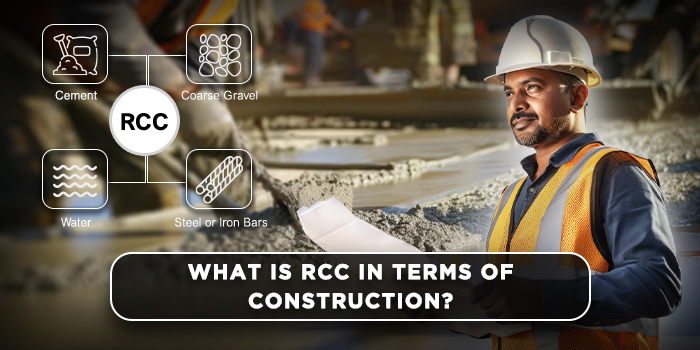RCC or reinforced cement concrete is a combination of cement, coarse gravel and water, which uses reinforcing steel or iron bars embedded in the concrete to enhance the strength and stability. It helps distribute pressure and stress evenly throughout the material. The concrete and reinforcement complement each other to form building blocks.

This renders RCC doubly resistant to compressive loading and a lot less vulnerable to disintegrating under tensile stress. Moreover, being more durable compared to traditional concrete, it has a longer life and rarely needs repairs. With all these pluses, besides being cost-effective, RCC has now become the default setting in the construction industry.
The 3 types of reinforced concrete in use are:
# Fibre reinforced concrete: This type uses mineral, steel and organic fibres and are primarily used in contemporary buildings and sidewalk overlays and offers uniform tensile strength at a reasonable cost.
# Polymer concrete: This group of RCC involves use of polymer binders in place of cement hydrate binders of traditional cement concrete en masse. The result is superior strength, adhesion, better scratch and chemical-resistance compared to standard concrete. Polymerization of binders at ambient temperatures causes polymeric concrete to harden.
# Ferrocement concrete: Cement mortar is mixed with wire meshes to prepare this type of concrete. Being lightweight and very adaptable, this concrete can be moulded into any desired shape. The material cost is lower, it is easy to construct and has a long life while being resilient to earthquakes.
What are the advantages of RCC?
# Offers superior tensile and compressive strength in comparison with other building materials.
# RCC buildings provide better longevity.
# Reinforced concrete can be cast into different moulds before the mix hardens.
# RCC structures have lower maintenance cost.
# RCC buildings offer better resistance to fire and quakes than steel-only structures.
# Level of workers’ skills required in the construction of RCC buildings is lower than that for steel structures.
Earlier, when most structures were built of concrete, often structural stability of the buildings would be below par, leading to an early collapse. This happened because concrete was not treated to withstand tensile pressure generated by the structures. On the contrary, buildings erected with RCC construction are much better equipped to handle tensile pressure and hence, has become so popular these days.
The real estate sector has come a long way and RCC is clearly the future of construction technology, driving sweeping changes in the industry, making brickworks gradually outdated. These changes, powered by constant investment in R&D, are also significantly contributing to the country’s economic growth
Disclaimer : Information contained and transmitted by us are for information purposes only. All views and/or recommendations are those of the concerned author personally and made purely for information purposes. Nothing contained in the articles should be construed as business, legal, tax, accounting, investment or other advice or as an advertisement or promotion of any project or developer or locality. Pioneer Property Management Ltd. does not offer any such advice. No warranties, guarantees, promises and/or representations of any kind, express or implied, are given as to (a) the nature, standard, quality, reliability, accuracy or otherwise of the information and views provided in (and other contents of) the articles or (b) the suitability, applicability or otherwise of such information, views, or other contents for any person’s circumstances. We shall not be liable nor shall be held responsible in any manner for any action taken based on the published information (whether in law, contract, tort, by negligence, products liability or otherwise) for any losses, injury or damage (whether direct or indirect, special, incidental or consequential) suffered by such person as a result of anyone applying the information (or any other contents) in these articles or making any investment decision on the basis of such information (or any such contents), or otherwise. The users should exercise due caution and/or seek independent advice before they make any decision or take any action on the basis of such information or other contents.